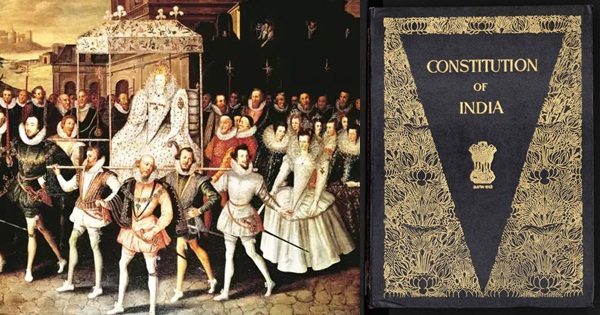Pleasure Doctrine: An Unpleasant Hangover of the Colonial Past

It’s now been more than seven decades that India has gained her freedom, but we still have some unpleasant practices, with hangars firmly in our colonial past. The question arises then that – are they just forgettable nightmares or are they still relevant ? The largest written constitution was supposed to erase and take care of all such hangovers, but has it been able to – with its endless amendments? We will examine one such principle in the paras below.
Traditionally, the middle class Indians believe “government job” to be an apple of the eye, coveted and above all – one which brings stability into one’s life, as an adage. Though it’s tough to secure a govt job, it’s even tougher to lose it. But is it so? Is a government job so secured? Our constitution declares on the contrary. Every government servant holds his post, till the pleasure of the President/Governor/His nominated authority. To elaborate, let us examine the relevant article of the constitution, viz. Article 310 (1) and (2), which deal with the tenure of a government servant.
310. Tenure of office of persons serving the Union or a State:
(1) Except as expressly provided by this Constitution, every person who is a member of a defence service or of a civil service of the Union or of an all India service or holds any post connected with defence or any civil post under the Union, holds office during the pleasure of the President, and every person who is a member of a civil service of a State or holds any civil post under a State holds office during the pleasure of the Governor of the State.
(2) Notwithstanding that a person holding a civil post under the Union or a State holds office during the pleasure of the President or, as the case may be, of the Governor of the State, any contract under which a person, not being a member of a defence service or of an all India service or of a civil service of the Union or a State, is appointed under this Constitution to hold such a post may, if the President or the Governor as the case may be, deems it necessary in order to secure the services of a person having special qualifications, provide for the payment to him of compensation, if before the expiration of an agreed period, that post is abolished or he is, for reasons not connected with any misconduct on his part, required to vacate that post.
I would also like to quote the Article 240 of Government of India Act, 1935 – the infamous British doctrine, formulated by our colonial masters in the thick of unrest of freedom movement, largely to choke it (it had no preamble) and which is believed to be the bedrock of our own Constitution.
General Provisions Article 240:
(1) Except as expressly provided by this Act, every person who is a member of a civil service of the Crown in India, or holds any civil post under the Crown in India, holds office during His Majesty’s pleasure.
(2) No such person as aforesaid shall be dismissed from the service of His Majesty by any authority subordinate to that by which he was appointed.
(3) No such person as aforesaid shall be dismissed or reduced in rank until he has been given a reasonable opportunity of showing cause against the action proposed to be taken in regard to him : Provided that this subsection shall not apply – (a) where a person is dismissed or reduced in rank on the ground of conduct which has led to his conviction on a criminal charge ; or (b) where an authority empowered to dismiss a person or reduce him in rank is satisfied that for some reason, to be recorded by that authority in writing, it is not reasonably practicable to give to that person an opportunity of showing cause.
(4) Notwithstanding that a person holding a civil post under the Crown in India holds office during His Majesty’s pleasure, any contract under which a person, not being a member of a civil service of the Crown in India, is appointed under this Act to hold such a post may, if the Governor-General, or, as the case may be, the Governor, deems it necessary in order to secure the services of a person having special qualifications, provide for the payment to him of compensation if before the expiration of an agreed period that post is abolished or he is, for reasons not connected with any misconduct on his part, required to vacate that post.
The two seem to be mirror images of each other. Under English Common Law, every servant in England holds office during the pleasure of the Crown and courts cannot adjudicate in it as in England, there’s no written constitution. But then what’s the position in India, which has the ‘longest written constitution’?
Why the government employee called the ‘servant’ ? Why the relationship between the employer and the employee called the “Master-Servant relationship”? Having served the government for almost three decades, these questions always disturbed me. When I accidentally discovered the ‘Doctrine of Pleasure’, it perturbed me furthermore. So, I decided to dig deeper. I found that as per Article 310 (1) any (any) government employee can be dismissed/removed /compulsorily retired any time by the President (if under employment of Union Govt) or the Governor (if under the employment of State Govt) and that s/he holds the appointment/tenure till the pleasure of the above authorities. The only exception are certain high dignitaries of the state under Articles 124,148,217,218 and 324.
They respectively provide that the Supreme Court judges, High Court judges, Accountant General and the Chief Election Commissioner shall not be removed except in the manner as laid down in these articles. The holders of these offices thus hold their offices, not during the ‘Pleasure of the President’, but “during good behavior” !!! The only protection, supposedly given to the employee is under the next article, i.e., Article 311. I quote –
Article 311. Dismissal, removal or reduction in rank of persons employed in civil capacities under the Union or a State:
(1) No person who is a member of a civil service of the Union or an all India service or a civil service of a State or holds a civil post under the Union or a State shall be dismissed or removed by a authority subordinate to that by which he was appointed.
(2) No such person as aforesaid shall be dismissed or removed or reduced in rank except after an inquiry in which he has been informed of the charges against him and given a reasonable opportunity of being heard in respect of those charges provided that where it is proposed after such inquiry, to impose upon him any such penalty, such penalty may be imposed on the basis of the evidence adduced during such inquiry and it shall not be necessary to give such person any opportunity of making representation on the penalty proposed: Provided further that this clause shall not apply (a) where a person is dismissed or removed or reduced in rank on the ground of conduct which has led to his conviction on a criminal charge; or (b) where the authority empowered to dismiss or remove a person or to reduce him in rank ins satisfied that for some reason, to be recorded by that authority in writing, it is not reasonably practicable to hold such inquiry; or (c) where the President or the Governor, as the case may be, is satisfied that in the interest of the security of the State, it is not expedient to hold such inquiry.
(3) If, in respect of any such person as aforesaid, a question arises whether it is reasonably practicable to hold such inquiry as is referred to in clause (2), the decision thereon of the authority empowered to dismiss or remove such person or to reduce him in rank shall be final It is clear from a simple reading of this article also that this protection is also largely ornamental and carries no guarantee for the continuity of job or doesn’t pose any serious challenge to the discretionary powers of the President /Governor
Though in many cases, the courts have upheld the pleasure principle, the particular case of S. Framji vs UoI (AIR 1960 Bombay) decided on 25th April, 1958, (i.e., a decade after independence and eight years after enactment of constitution), by Justice Chagla, CJ and Justice S.T.Desai, J, is still relevant. The fact of the case is that the plaintiff was appointed as a Guard in 1929, in NW Railway. He was made permanent in Grade II in 1944 in Railways and on partition, he opted for India and served the BB & CI Railways. On 31st January, 1950, his post in NW Railway was equated to Grade C. He challenged the order, hence the case. The Hon’ble court went to the extent of examining the rights of the government employee to approach court, in case of a service grievance –
“Can a servant of the State sue the State in respect of any condition of service relating to his employment ?” It goes on to observe that the Statutory Rules framed by the Railways are merely for “guidance” and do not form a Contract between the Union of India and the government servant. It held that the provisions of Article 310 (2) are for certain high dignitaries (as enumerated above) like the Supreme Court judges, High Court judges etc and whose tenure are fixed and that they hold office ‘during good behaviour’.
He observed that the Principle of Pleasure is not a new expression introduced by the Constitution. It is a principle well known to the English Common Law – every servant in England holds the office during the pleasure of the Crown. He further infers that “one view of the article is that as per Article 310, a civil servant holds his office till the pleasure of the President, while the other view is that not only his services are terminable at the pleasure of the King or the President, but that his services under the government is not a creature of a contract and cannot be regulated by terms of a contract and that no term of service can be made justiciable nor can a government servant assert any right relating to his service in a court of law”
The learned Chief Justice then referred to the observations of the Privy Council in Venkata Rao’s case and quoted the following passage from the judgement of Lord Hobhouse in the case of Shenton vs Smith (1895 AC 229) “unless in special cases, where it is otherwise provided, servant sof the Crown hold their office during the pleasure of the Crown”, not by the virtue of any special prerogative of the Crown, but because such are the terms of their engagement, as is well understood throughout the public service. If any public servant understands that he has been dismissed unjustly, his remedy is not by a law-suit, but by an appeal of an official or political kind … As for the regulations, their Lordships agree with Stone J, that they are merely directions given by the Crown to the Governments of the Crown
Colonies for general guidance and that they do not constitute a contract between the Crown and its servants.”
In a clear observation that the relationship between the governments and its employees remained unchanged even after independence, the Hon’ble court observed the following after comparing the Government of India Act, 1919, 1935 and the Constitution of India –
“Now there is nothing in the language of Articles 309 and 313, which bring about any change from the position which obtained under the Government of India Act’. Further it observed “When the Constitution of India accepts and adopts a doctrine well known to the Common Law of England, the doctrine that a Civil Servant holds his office at the pleasure of the Crown, it is futile to suggest that the Constitution makers did not wish that doctrine to have full sway. It must not be forgotten that the doctrine does not owe its origin to the sanctity in which the Crown is held in England, nor to its absolute powers or to its prerogatives. That doctrine is based upon principles of public policy and there is to reason to suggest that principles of public policy which have endured for hundreds of years in England should not have been accepted by us and incorporated in our
constitution.”
To top it all in the cases of State of Andhra Pradesh vs Kameshwara Rao (AIR 1956 AP 794) and T. Ramayya Suri vs State of Madras (WP no. 817 of 1952 – Andhra) the Courts stressed that the rules framed under the Government of India Act, 1935 had statutory force and the Government was not entitled to act in violation of these rules.
Actually the pleasure doctrine originally flows from the Article 240 of Government of India Act, 1935. The whole article 310 of the Constitution is almost a reproduction of Article 240 of GoI Act, 1935, with the only protection being awarded in the Constitution itself.
The above presents a rather grim picture of the whole premise of government service. It can be safely inferred from the above that the most secured, sought after and priced job, actually stands fixed on a quicksand-base, suspended by a narrow thread held by the President/Governor/Nominated authority, ‘at his pleasure’ and is actually the most insecured job of this erstwhile colony. All the service rules hence actually provide no protection and are mere ‘administrative guidelines’ only, with no statutory protection and the poor government “servant” (who is also a citizen), is actually and perennially at the mercy of the President/Governor/his nominees. The State has absolute control over the tenure of any govt servant and holds the whiphand. Are we really free in the literal sense of the word or still serving the Crown and ‘Her Majesty’. You ponder!!
The ‘Pleasure Doctrine’ is a principle of the common law, the origins of which may be traced back to the development of the concept in the United Kingdom. Similar provisions have been included in the Constitution of India to protect the interest of civil servants along with the protection of national security and public interest. This power to dismiss a Government servant at pleasure is subject to only those exceptions which are specified in the Constitution itself. It must be ensured that civil servants can’t make mockery of law if they are guilty and it is precisely for that reason, that the continued use of Doctrine of Pleasure or ‘Pleasure Doctrine’ is required in India.
Featured image courtesy: Google.






